| Listing 1 - 10 of 13 | << page >> |
Sort by
|
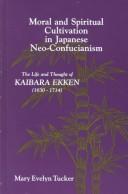
ISBN: 088706891X Year: 1989 Publisher: Albany State university of New York press
Abstract | Keywords | Export | Availability | Bookmark
 Loading...
Loading...Choose an application
- Reference Manager
- EndNote
- RefWorks (Direct export to RefWorks)
J1008.60 --- J1440 --- J1560 --- J1650 --- Japan: Philosophy -- history -- Kinsei, Edo, Tokugawa period, early modern (1600-1867) --- Japan: Philosophy -- Confucianism --- Japan: Philosophy -- individual philosophers -- Kinsei, Edo, Tokugawa period, early modern (1600-1867) --- Japan: Philosophy -- ethics --- Kaibara, Ekiken, --- Kaibara, Atsunobu --- Ekiken, Kaibara, --- Kaibara, Ekken --- Sonken --- Kaibara, Sukesaburō --- Kaibara, Kyūbē --- Kaibara, Shisei --- 貝原盆軒 --- 貝原益軒 --- 貝原篤信 --- 카이바라, 에키켄
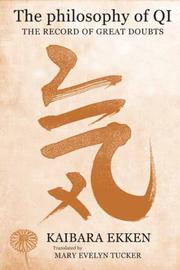
ISBN: 0231139225 9780231139229 0231511299 9780231511292 Year: 2007 Publisher: New York, NY
Abstract | Keywords | Export | Availability | Bookmark
 Loading...
Loading...Choose an application
- Reference Manager
- EndNote
- RefWorks (Direct export to RefWorks)
The Record of Great Doubts emphasizes the role of qi in achieving a life of engagement with other humans, with the larger society, and with nature as a whole. Rather than encourage transcendental escapism or quietism, Ekken articulates a philosophy of material force as a basis of living a life of commitment to the world. In this spirit, moral cultivation is not an isolated or a self-centered preoccupation, but an activity that occurs within the dynamic forces of nature and amid the rigorous demands of society. In this context, a vitalism of qi is an emergent force, not only providing the philosophical grounding for this vibrant interaction but also giving a basis for an investigation of the natural world that plumbs the principle within things. Ekken thus aimed to articulate a creative and dynamic milieu for moral education, political harmony, social coherence, and agricultural sustainability. The Record of Great Doubts embodies Ekken's profound commitment to Confucian ideas and practices as a method for establishing an integrative ethical vision, one he hoped would guide Japan through a new period of peace and stability. A major philosophical treatise in the Japanese Neo-Confucian tradition, The Record of Great Doubts illuminates a crucial chapter in East Asian intellectual history.
Conduct of life --- Conduct of life. --- Conduct of life -- Early works to 1800. --- Philosophy & Religion --- Philosophy --- Ethics. --- Deontology --- Ethics, Primitive --- Ethology --- Moral philosophy --- Morality --- Morals --- Philosophy, Moral --- Science, Moral --- Values
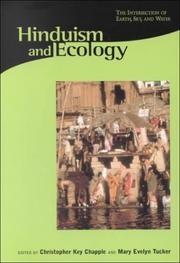
ISBN: 0945454260 0945454252 9780945454250 9780945454267 Year: 2000 Publisher: Cambridge: Harvard university press,
Abstract | Keywords | Export | Availability | Bookmark
 Loading...
Loading...Choose an application
- Reference Manager
- EndNote
- RefWorks (Direct export to RefWorks)
This fourth volume in the series exploring religions and the environment investigates the role of the multifaceted Hindu tradition in the development of greater ecological awareness in India. The twenty-two contributors ask how traditional concepts of nature in the classical texts might inspire or impede an eco-friendly attitude among modern Hindus, and they describe some grassroots approaches to environmental protection. They look to Gandhian principles of minimal consumption, self-reliance, simplicity, and sustainability. And they explore forests and sacred groves in text and tradition and review the political and religious controversies surrounding India's sacred river systems.
Ecology --- Hinduism --- Natural history --- Nature --- Religious aspects --- Hinduism. --- Doctrines. --- Balance of nature --- Biology --- Bionomics --- Ecological processes --- Ecological science --- Ecological sciences --- Environment --- Environmental biology --- Oecology --- Religious aspects&delete& --- Doctrines --- Environmental sciences --- Population biology --- Indian religions --- Human ecology. Social biology --- Ecology - Religious aspects - Hinduism. --- Nature - Religious aspects - Hinduism. --- Natural history - India. --- Hinduism - Doctrines.
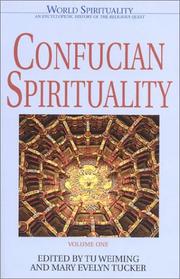
ISBN: 0824521110 Year: 2003 Publisher: New York Crossroad
Abstract | Keywords | Export | Availability | Bookmark
 Loading...
Loading...Choose an application
- Reference Manager
- EndNote
- RefWorks (Direct export to RefWorks)
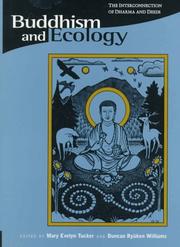
ISBN: 0945454147 0945454139 9780945454144 9780945454137 Year: 1997 Publisher: Cambridge: Harvard university press,
Abstract | Keywords | Export | Availability | Bookmark
 Loading...
Loading...Choose an application
- Reference Manager
- EndNote
- RefWorks (Direct export to RefWorks)
Buddhism is a tradition which has cultivated a profound sense of the interconnection of all life-forms in its doctrine of dependent origination. This teaching of interrelatedness may be a critical basis for the recovery of human reciprocity with nature and with all life-forms. This volume examines Buddhism's understanding of the intricate web of life. In noting the cultural diversity of Buddhism, it highlights aspects of the tradition which may be helpful in formulating an effective environmental ethics. It cites examples from both Asia and the United States of socially engaged Buddhist projects to protect the environment. Finally, the volume explores some of the theoretical and methodological issues involved in such a project. Elaborating upon topics introduced at a conference at the Harvard University Center for the Study of World Religions, the authors analyze the prospects and the problems of using Buddhism as an environmental resource in both theory and practice.
#SBIB:39A10 --- #SBIB:316.331H351 --- Antropologie: religie, riten, magie, hekserij --- Godsdienst en verstedelijking --- Ecology --- Human ecology --- Religious aspects --- Buddhism. --- Environment, Human --- Human beings --- Human environment --- Ecological engineering --- Human geography --- Nature --- Balance of nature --- Biology --- Bionomics --- Ecological processes --- Ecological science --- Ecological sciences --- Environment --- Environmental biology --- Oecology --- Environmental sciences --- Population biology --- Religious aspects&delete& --- Buddhism --- Social aspects --- Effect of environment on --- Effect of human beings on --- Human ecology - Religious aspects - Buddhism. --- Ecology - Religious aspects - Buddhism.
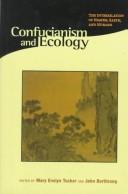
ISBN: 0945454163 0945454155 9780945454168 9780945454151 Year: 1998 Publisher: Cambridge: Harvard university press,
Abstract | Keywords | Export | Availability | Bookmark
 Loading...
Loading...Choose an application
- Reference Manager
- EndNote
- RefWorks (Direct export to RefWorks)
Confucianism demonstrates a remarkable wealth of resources for rethinking human-earth relations. This second volume in the series on religions of the world and the environment includes sixteen essays that address the ecological crisis and the question of Confucianism from three perspectives: the historical describes this East Asian tradition's views of nature, social ethics, and cosmology, which may shed light on contemporary problems; a dialogical approach links Confucianism to other philosophic and religious traditions; an examination of engaged Confucianism looks at its involvement in concrete ecological issues.
S12/0400 --- S20/0500 --- S12/0214 --- China: Philosophy and Classics--Kongzi 孔子 Confucius and Confucianism --- China: Agriculture forestry, fishery, natural disasters--Environmental policy, pollution --- China: Philosophy and Classics--Philosophy of nature --- Ecology --- Environmental ethics --- Philosophy, Confucian --- Confucian philosophy --- Confucianism --- Philosophy, Chinese --- Environmental quality --- Human ecology --- Ethics --- Balance of nature --- Biology --- Bionomics --- Ecological processes --- Ecological science --- Ecological sciences --- Environment --- Environmental biology --- Oecology --- Environmental sciences --- Population biology --- Philosophy --- Moral and ethical aspects --- Philosophy, Confucian. --- Philosophy. --- Ecology - China - Philosophy. --- Environmental ethics - China.
Book
ISBN: 1783748052 1783748044 1783748036 9791036560781 Year: 2020 Publisher: Cambridge, England : Open Book Publishers,
Abstract | Keywords | Export | Availability | Bookmark
 Loading...
Loading...Choose an application
- Reference Manager
- EndNote
- RefWorks (Direct export to RefWorks)
This book is a celebretion of the diversity of ways in which humans can relate to the world around them, and an invitation to its readers to partake in planetary coexistence. Innovative, informative, and highly accessible, this interdisciplinary anthology brings together scholars and educators across the sciences and humanities, in a collaborative effort to illuminate the different ways of being in the world and the different kinds of knowledge they entail – from the ecological knowledge of indigenous communities, to the scientific knowledge of a biologist, and the embodied knowledge communicated through storytelling. This anthology examines the interplay between Nature and Culture in the setting of our current age of ecological crisis, stressing the importance of addressing these ecological crises occurring around the planet through multiple perspectives. These perspectives are exemplified through diverse case studies – from the political and ethical implications of thinking with forests, to the capacity of storytelling to motivate action, to the worldview of the Indigenous Okanogan community in British Columbia. Living Earth Community is essential reading not only for researchers and students, but for anyone interested in the ways humans interact with the community of life on Earth, especially during this current period of environmental emergency. As with all Open Book publications, this entire book is available to read for free on the publisher’s website. Printed and digital editions, together with supplementary digital material, can also be found at www.openbookpublishers.com
Human ecology. --- Ecology --- Environment, Human --- Human beings --- Human environment --- Ecological engineering --- Human geography --- Nature --- Social aspects --- Effect of environment on --- Effect of human beings on
Book
ISBN: 1608331539 1570759170 Year: 2011 Publisher: [s.l.] : Orbis Books,
Abstract | Keywords | Export | Availability | Bookmark
 Loading...
Loading...Choose an application
- Reference Manager
- EndNote
- RefWorks (Direct export to RefWorks)
"[This book] may be the best guide yet to the work of Thomas Berry. It is as though these essays embody the bonding force he calls the Great Compassionate Curve of the universe."--Catherine Keller "A highly readable gem."--Catholic Library World "Inspiring, often lyrical."--St. Anthony Messenger Like no other religious thinker, Thomas Berry has been a prophetic voice regarding Earth's destruction and the urgent need for human response from the Christian community. This book collects Berry's signature views on the interrelatedness of both Earth's future and the Christian future. He ponders why Christians have been late in coming to the issue of the environment. He reflects insightfully on how the environment must be seen as a religious issue, not simply a scientific or economic problem. In powerful and poetic language Berry presents a compelling vision of the sacredness of the universe and the interrelatedness of the Earth community. Drawing on Thomas Aquinas and Teilhard de Chardin he brings the Christian tradition into a cosmology of care for the whole of creation.
Religion / Essays --- Nature / Environmental Conservation & Protection --- Religion / Christianity --- Nature
Book
ISBN: 9781138789579 9781138315938 1138315931 Year: 2018 Publisher: London Routledge
Abstract | Keywords | Export | Availability | Bookmark
 Loading...
Loading...Choose an application
- Reference Manager
- EndNote
- RefWorks (Direct export to RefWorks)
The moral values and interpretive systems of religions are crucially involved in how people imagine the challenges of sustainability and how societies mobilise to enhance ecosystem resilience and human well-being. This handbook provides the most comprehensive and authoritative overview of the field. It encourages both appreciative and critical angles regarding religious traditions, communities, attitude, and practices.
Ecotheology --- Ecology --- Nature --- Religious aspects --- religion and ecology --- the movement of religion and ecology --- global traditions --- Hinduism --- Buddhism --- Confucianism --- Judaism Hava --- Christianity --- Islam --- Bahai --- Mormonism --- indigenous cosmovisions --- Africa --- Asia --- the Pacific region --- North America --- the Arctic --- Latin America --- regional landscapes --- India --- China --- African diaspora --- nature spiritualities --- paganism and animism --- spiritual ecology and radical environmentalism --- nature writing and nature mysticism --- planetary challenges --- climate change --- biodiversity --- oceans --- conservation and restoration --- food and agriculture --- water --- animals --- population --- consumption --- gender injustice --- environmental justice --- environmental humanities --- history --- literature --- philosophy --- art --- environmental sciences --- policy --- law --- economics
Book
ISBN: 9780231149525 9780231520645 Year: 2009 Publisher: New York Columbia University Press
Abstract | Keywords | Export | Availability | Bookmark
 Loading...
Loading...Choose an application
- Reference Manager
- EndNote
- RefWorks (Direct export to RefWorks)
Cosmology --- Evolution --- Philosophical anthropology --- Religion --- Religions --- Spirituality
| Listing 1 - 10 of 13 | << page >> |
Sort by
|

 Search
Search Feedback
Feedback About UniCat
About UniCat  Help
Help News
News